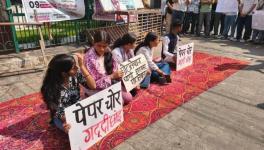Uttarakhand: Women's Groups Reject Uniform Civil Code Bill, Call for Further Deliberations

New Delhi: In a bold stance against the proposed Uniform Civil Code (UCC) Bill presented at the Uttarakhand Legislative Assembly, women's groups and representatives in Uttarakhand have unequivocally rejected the draft. The bill, aimed at introducing uniform civil laws across religious communities, has drawn sharp criticism for its perceived infringements on constitutional rights and its failure to address gender inequalities effectively.
According to the collective response from Uttarakhand's women's groups, the bill, as it stands, "criminalises and regulates constitutionally acceptable behaviours" and introduces elements of moral policing. The representatives highlight concerns about autonomy and choice, particularly regarding adult consenting cohabitation, commonly referred to as "live-in relationships". They assert that the bill's provisions would erode the hard-won rights of women and undermine their struggles for equality within both domestic and public spheres.
Critics point out that while the bill claims to offer uniformity across religious lines, it disproportionately targets the Muslim minority community, criminalising aspects of their personal and marital practices without adequately incorporating positive and progressive elements from Muslim family law. The bill's focus on rectifying perceived defects in Muslim law while ignoring similar issues within Hindu family laws has raised concerns about bias and selective application.
“Majorly, it seeks to introduce changes in the provisions that are perceived as defective in the Muslim law, such as unequal inheritance, polygamy and the practice of halala ( by which a person can only remarry his divorced spouse after she has married someone else, consummated the marriage and thereafter obtained a divorce). In one sense the Bill has terminated the application of Muslim family law and has further criminalised the Muslim man and woman. Ironically, the Bill has not incorporated positive and progressive aspects of Muslim law such as the compulsory payment of mehr by the husband to the wife which provides financial security of the wife, nikahnama (marriage contract) which allows for the spouses to add legally binding conditions that are mutually acceptable, and a 1/3 limit rule for willing away property. Had the intention of the Bill genuinely been to bring about gender justice, such provisions could have been extended to women of all communities,” an excerpt from the statement reads.
Furthermore, the bill's silence on critical issues such as custody, guardianship, and adoption of children, as well as the rights of queer and transgender persons within families, has been deemed unacceptable by the women's groups. They argue that the bill's failure to address these issues reflects a lack of inclusivity and consideration for marginalised communities.
Of particular concern is the retention of archaic provisions, such as the restitution of conjugal rights, which has been challenged for its constitutional validity. Critics argue that such provisions perpetuate gender-based violence and undermine fundamental rights, including the right to live with dignity and freedom of choice.
The groups also maintain that this law denies or takes away fundamental rights. Even the existing provision of women's right to reside in their matrimonial homes has been taken away. “Thus rights to equality, right to live and livelihood and to live with dignity, right to freedom of speech and expression, freedom of conscience and right to freely profess, practice and propagate religion, have become casualties under this Bill,” the statement reads.
In light of these concerns, the women's groups call for the bill to be referred to a Standing or Select Committee for further deliberations. They emphasise the importance of incorporating diverse perspectives, including those of women, queer, and transgender communities, in shaping legislation that will have far-reaching implications for the people of Uttarakhand and beyond.
“In this form, this Bill should be referred to a Standing or a Select Committee for wider deliberations, as the Bill, which has much import for the people of Uttarakhand and also for the rest of India as a precedent setter, needs to be discussed and people’s, including diverse women’s, queer and trans communities’ responses from Uttarakhand need to be taken into account,” it concluded.
Get the latest reports & analysis with people's perspective on Protests, movements & deep analytical videos, discussions of the current affairs in your Telegram app. Subscribe to NewsClick's Telegram channel & get Real-Time updates on stories, as they get published on our website.
























